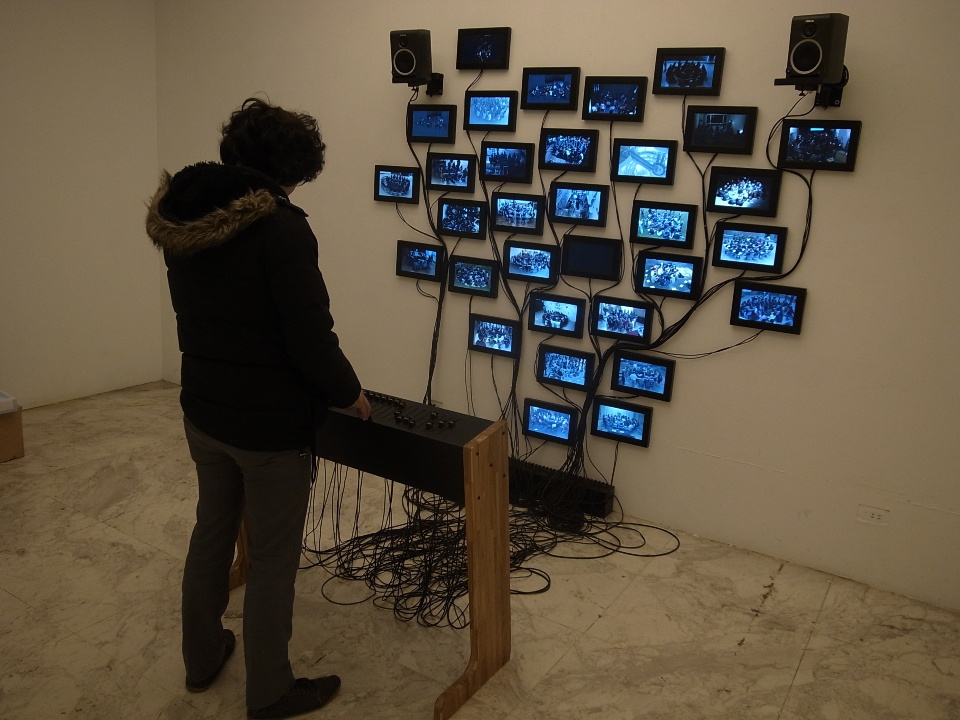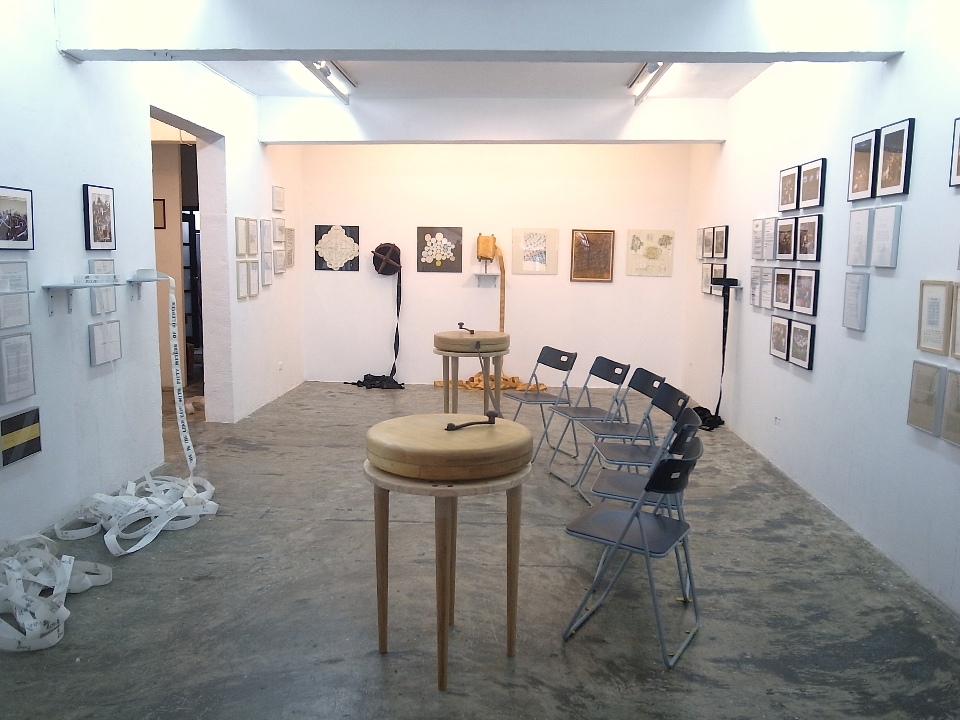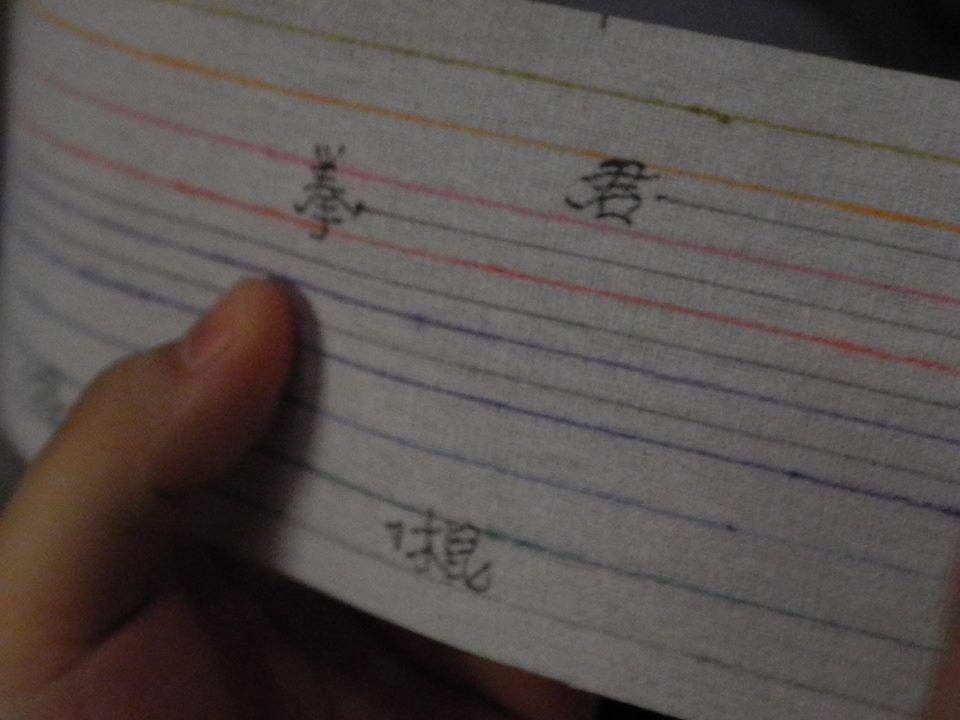磁帶音樂系列始於2004年台北聲納國際科技藝術節的一場表演,在這場稱為「數位-類比音樂」的表演中,主持人以四張不同顏色旗子分別指揮觀眾演奏四種可以發出噪音的樂器,並自舞台上傳予觀眾一條書有音符簡譜和詩句的長帶(音腸),任由觀眾頌唱演繹。這一場表演在爾後衍生為一系列聲音實驗,這些實驗的共同之處在於,觀眾被當成計算機或磁帶機的零組件。而作曲者的工作,僅僅在於給予在場觀眾一個簡單的發聲程式(遊戲規則),讓觀眾自行組織起來,利用自己的身體或作曲者提供之發聲具,主動完成演出。
2004-2013 十年間,「音腸」在世界各地,與各種不同階層,不同性質的團體,合作了五十餘場演出。此間除了在純藝術空間的發表,音腸也參與各種音樂節,行為藝術節,並在酒吧,Live House,小劇場演出,更不乏直接走入社區,與各類地方團體進行合作。在與非藝術團體的合作中,音腸另外發展出了「聲音的社會測量」系列,也就是音腸的錄影裝置版。
「音腸混音機 2004-2013」,是為磁帶音樂計劃十年的一次大匯整。從有錄影紀錄的五十餘場演出中,擇取相同攝影角度的三十二場,以三十二台數位相框同時播放,一次盡觀各個團體殊異的音腸演繹,觀眾還可以混音機操控聲軌。本展除了前述二裝置,還一併展出創作筆計,繪圖手稿,演出照片,以及音腸母帶,相關創作等。
林其蔚 LIN Chi-Wei
林其蔚 1971 出生於台灣,1992加入「零與聲音解放組織」(1992-2000)。曾就讀於輔仁大學法國語文學系、國立藝術學院傳統藝術研究所、及法國當代藝術工作室 (le Fresony)。參與 1995年台北縣後工業藝術祭。
LIN Chi-wei was born in Taiwan in 1971. He joined Zero and Sound Liberation Organization (1992-2000) in 1992. He received a degree in French from Catholic Fu Jen University, and once studied in the graduate program of Traditional Arts in Taipei National University of the Arts (formerly known as National Institute of the Arts), and Studio National des Arts Contemporains (le Fresnoy), and had participated in Taipei Post-Industrial Arts Festival in 1995.
林其蔚
張雅雯
彭潔儀
周依萱
許立偉
范淑詒
蕭淳方
蔡千雅
張彧彧、莊妤甄、吳貞儀
施惠婷、吳岱焄、陳秀彤
游博能、韓智淳
方軾涵、朱宴仁
伊通公園
關鍵字
- 聲音
- 錄像裝置
- 草圖
- 合聲器
- 音腸
- 合聲
- 噪音
藝術家談作品
我沒有完成作品的習慣。
我沒有完成作品的習慣,做出來的東西也不太能夠在現存空間中展演,好像離專業藝術創作還有很長距離...。
評審談作品
一個沒有被科技符號異化的國度。
入圍理由 Reason for Nomination
林其蔚的《磁帶音樂》系列歷經九年的實行,在世界各地演出,僅是透過單音節或相近的語音,在眾人的依序念誦之下形成語聲的合聲,召喚著一種屬於人身在世的共同體,在數位媒體化的科技世界裏尤顯別具意涵。在伊通公園的個展,林其蔚以文件、道具、草圖與錄像裝置等元素,清楚地表述這個長期計畫的美學內涵;一方面,背反了台灣自90年代以來聲音創作的科技媒體化,另一方面,身體被視為聲響的必然載具,其聲音儀式之質樸,像是能匯通人與自然,並尋回人際的始初連結,指向一個沒有被科技符號異化的國度。 提名觀察人 ─ 陳泰松
LIN Chi-Wei’s Tape Music 2004-2013 was a project that lasted nine years, performed at different venues around the world. Through monotones or similar tones, it formed a phonetic chorus with people’s chanting in an orderly fashion, invoking a sense of collective existence, which seemed specifically meaningful in this technological world of digital media. In the solo exhibition at IT Park, Lin clearly stated the aesthetic meaning of this long-term project with elements such as documents, props, sketches and video installations. On the one hand, it contradicted the massive use of technological media in sound creation in Taiwan since the 90s; on the other hand, as physical bodies were deemed as a prerequisite for making sounds, the simple and unadorned quality of Lin’s sound rituals seemed to have merged human beings and nature, re-establishing the primitive connection individuals and pointing to a realm un-alienated by technological symbols. Nominator: CHEN Tai-Song






